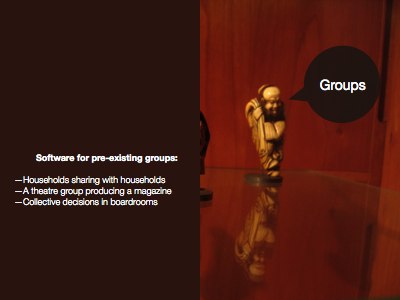Movement
The challenge I’m thinking of is this: how do we make group software for groups that already exist? I can’t even think how to design a good sign-in system that doesn’t require usernames and passwords. Because these people don’t need to identify themselves individually. I can’t think of a good piece of special group knowledge we could rely on.
The reason this crops up for me, as a challenge, is going back to the radio I’ve been working on. This is a device which enables social sharing of listening, but the device is situated in a household which has multiple people living in it. I don’t want to make people log in before listening to music. That would be insane. And a radio is naturally a household device; it doesn’t belong to any particular person.
So my question here is another Web design problem. Let’s pretend we have whole households sharing data or socialising with whole other households. What is the equivalent in identity here? How do different people in the household have access to different permissions? How do, say, a theatre group write a magazine between themselves, handing the document between themselves with the minimum of structure? Or how does a workshop, sitting round a boardroom table, use software to come to decisions or operate collectively?
These are hard problems. We forget how easy our lives are now, now people have invented the patterns to register, or make a friends list, or privacy settings, or whatever, as individuals.
If the Web is to go truly mainstream, it needs to be useful for and acknowledge that social networks and groups pre-existing, and deal with groups as their own entities instead of collections of individuals.
That’s tough challenge number two.
